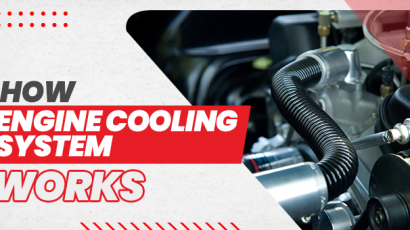
Imagine this: you pull into your driveway after a sunny afternoon drive, and even after switching off the engine, a persistent whirring sound emanates from under the hood. It’s your radiator fan, and unlike its usual on-and-off cycle, it seems determined to stay on. Should you be worried?
The answer, like most car troubles, depends on several factors. A radiator fan that runs constantly can indicate an underlying issue, but it might also be completely normal. This guide delves into the reasons behind a persistently running radiator fan, empowering you to diagnose the problem and decide on the next steps.
Understanding the Role of the Radiator Fan
First, here is a quick refresher on the cooling system’s MVP: the radiator fan. Its job is simple yet crucial – to pull air through the radiator, drawing heat away from the engine coolant and keeping your car from overheating. Modern cars typically use electric radiator fans controlled by the engine computer (ECU) based on coolant temperature readings.
In normal operation, the fan cycles on and off as needed. However, certain situations can cause it to run continuously, and that’s what we’ll explore next.
Reasons Why Your Radiator Fan Keeps Running when Car is on
There are several reasons why your engine fan stays on and refuses to take a break. Let’s break them down:
High Engine Temperature: This is the most common and expected scenario. If your engine is running hotter than usual due to heavy traffic, hot weather, or towing a load, the ECU will keep the fan running to compensate. Once the engine cools down, the fan should cycle off.
Low Coolant Level: Coolant acts as a heat transfer medium, carrying heat from the engine to the radiator. If the coolant level is low, the radiator may not be able to absorb heat efficiently, causing the engine to overheat and the fan to stay on.
Faulty Coolant Temperature Sensor: This sensor relays engine temperature information to the ECU. If the sensor malfunctions and sends false readings of high temperature, the ECU will keep the fan running unnecessarily.
Stuck Fan Relay: The fan relay acts as a switch, controlling power to the fan. If the relay gets stuck in the “on” position, the fan will run continuously regardless of engine temperature.
Electrical Wiring Issues: Damaged or corroded wiring related to the fan circuit can disrupt communication between the ECU and the fan, leading to it running constantly.
Faulty Fan Motor: Although less common, the fan motor itself could be malfunctioning, causing it to run continuously or not function at all.
How to Diagnose the Problem
Here’s how you can narrow down the culprit behind the issue of the radiator fan always on:
Visual Inspection: Pop the hood (when the engine is cool!) and check the coolant level in the reservoir. A low level suggests a potential leak or inadequate coolant. Look for any visible damage to the fan or its wiring.
Temperature Gauge: If your car has a temperature gauge, monitor it while driving. A reading consistently in the red zone indicates overheating and justifies the fan’s continuous operation.
Listen to the Fan: While the fan running is normal, an unusually loud or uneven noise could point towards a failing fan motor or debris stuck in the blades.
Important Safety Note: Never open the radiator cap on a hot engine. The coolant can be scalding. Wait until the engine cools down completely before checking the coolant level.
When to Seek Professional Help
If the following situations arise, it’s best to consult a qualified mechanic:
- The coolant level is low, and you can’t identify or fix the leak.
- The temperature gauge consistently reads high.
- You suspect a faulty sensor, relay, or wiring issue.
- The fan makes unusual noises or doesn’t run at all.
- You’re uncomfortable troubleshooting the problem yourself.
Preventing a Persistently Running Fan
Here are some proactive measures to keep your radiator fan functioning optimally and prevent future issues:
Regular Coolant Maintenance: Schedule regular coolant flushes and top-offs according to your car’s manufacturer’s recommendations.
Inspect the Cooling System: Look for leaks or loose hoses during routine maintenance checks.
Avoid Overheating: Don’t push your car too hard in extreme heat or during heavy traffic.
Clean the Radiator: A clogged radiator can impede airflow, so consider a professional cleaning occasionally, especially in dusty environments.
Addressing the Concerns specific to Used Cars for Sale in Zambia
While the information above applies to most vehicles, there are some additional considerations for used cars. Here’s how a pre-owned car might influence a persistently running radiator fan:
Age and Wear: As a car age, various components in the cooling system can wear down. A weaker fan motor, for instance, might struggle to maintain proper airflow, leading to the ECU keeping it running longer. Similarly, worn-out hoses or a clogged radiator in a used car could reduce cooling efficiency, triggering the fan to compensate.
Service History: A well-maintained used car with a documented service history for cooling system components like coolant flushes and thermostat replacements is less likely to have a persistently running fan due to neglect. If you’re considering a used car, inquire about the cooling system’s service history.
Potential Modifications: Some used cars might have undergone performance modifications that could impact cooling efficiency. For example, a larger engine swap might require a higher-capacity radiator and a more powerful fan to handle the increased heat load. Ensure any modifications are professionally done and compatible with the car’s cooling system.
Radiator Fan Keeps Running When Car is On – Solutions
Now, let’s delve into solutions for a persistently running fan:
DIY Fixes (with Caution): If you’re comfortable with basic car maintenance, you can attempt some troubleshooting steps. Remember, prioritize safety first! Here are some options, but consult a mechanic if unsure:
Topping Off Coolant: As mentioned earlier, a low coolant level can trigger the fan. Addressing a leak or simply topping off the coolant reservoir might be all it takes.
Checking Fan Operation: With the engine cool, you can carefully spin the fan by hand. It should rotate freely with minimal resistance. A seized fan motor would require professional replacement.
Professional Repairs: For most scenarios, especially those involving sensors, relays, wiring, or a failing fan motor, seeking a qualified mechanic is the best course of action. They have the expertise and diagnostic tools to pinpoint the exact issue and recommend the appropriate repair.
The Takeaway: Don’t Ignore a Running Fan, But Don’t Panic Either
A radiator fan running constantly on your car can be unnerving, but it doesn’t necessarily spell disaster. By understanding the potential causes and taking appropriate action, you can ensure your car’s cooling system functions optimally and prevent future problems. Remember, routine maintenance is key to a healthy cooling system and a happy car.
Additional Tips:
Keep your car’s owner’s manual handy. It contains valuable information specific to your car’s cooling system, including recommended coolant type and capacity. If you’re unsure about any aspect of troubleshooting or repairs, don’t hesitate to consult a trusted mechanic. Their expertise can save you time, money, and potentially prevent further damage to your car.
By following these tips and maintaining a proactive approach to your car’s cooling system, you can ensure your radiator fan functions as intended, keeping your engine running cool and your drives worry-free.
Looking for a reliable vehicle to keep you on the road? Consider a used Suzuki Alto for sale. It’s a compact and efficient choice that fits perfectly with your proactive maintenance routine. Visit us today to explore our selection and drive away with confidence!











